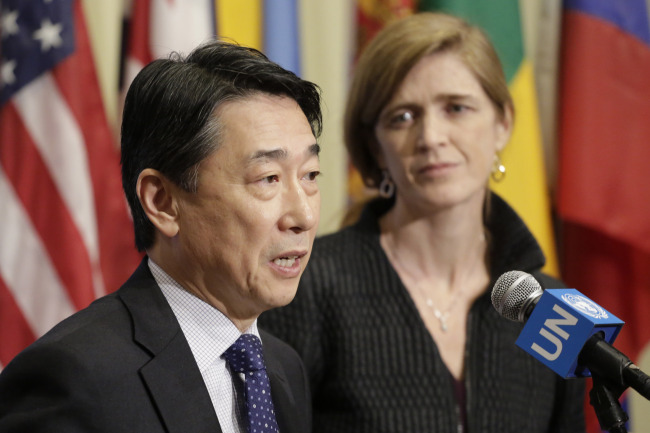Debate is heating up after South Korea last week questioned the legitimacy of North Korea’s membership in the U.N. for the first time, taking issue with its unrelenting breach of Security Council resolutions that ban nuclear and ballistic missile tests.
Seoul’s U.N. representative Oh Joon brought up the issue at a UNSC meeting on Feb. 15, saying Pyongyang has shown “contempt and disregard for the functions and powers” of the top decision-making body through four rounds of atomic experiments and six long-range rocket firings which led to four resolutions.
The point was reiterated one day later by Lee Ja-hyung, a counselor at the South Korean mission there, at a meeting of the Special Committee on the Charter of the U.N. and on the Strengthening of the Role of the Organization.
“Twenty-five years ago, the DPRK solemnly pledged to comply with the obligations of the U.N. Charter as a new member, but during the past decade, it has persistently violated all Security Council resolutions on the DPRK,” Oh said, calling North Korea by its official name, the Democratic People’s Republic of Korea.
“This is not only a direct challenge to the authority of the UNSC, but also a contradiction to both the letter and spirit of the pledge it made. This breach of obligation by the DPRK calls into question its qualification as a member of the United Nations.”
 |
| South Korean Ambassador to U.N. Oh Joon (Yonhap) |
In a media interview last Friday, Foreign Minister Yun Byung-se went further, saying it is “considerably noticeable that such talks are beginning to emerge,” though he cautioned against “over interpreting a claim raised by very few nations.”
Though primarily intended to ratchet up pressure on Pyongyang and emphasize the need for much more powerful punishment this time given the ongoing UNSC discussions, the remarks sparked skepticism over the idea’s efficacy and use.
Any expulsion of a member state requires a recommendation of the council, which in the case of North Korea is extremely unlikely given the predicted opposition of China and Russia, the veto-wielding permanent powers and Pyongyang’s staunch backers.
Even if they did agree to eject the North, it would do little, if anything, to resolve the nuclear issues, as the international community will virtually lose the means to punish the regime in future events, critics say.
“Not only is it practically undoable, the idea would have no significance except to put North Korea to shame,” a senior Foreign Ministry official said, asking anonymity due to the sensitivity of the matter.
As controversy intensified, another senior official sought to dilute the U.N. diplomats’ comments on Monday, saying they were made in line with the context and purpose of the sessions and not aimed at calling for action.
“It was not meant to urge any serious action and was born out of frustration and disappointment at the North’s persistent violations of UNSC resolutions,” the official told reporters on customary condition of anonymity. “Other countries also raised issue during the meeting with the ongoing charter breaches in similar contexts.”
But others appeared more serious about the notion. Katharine Moon, the SK-Korea Foundation Chair in Korea studies at the Brookings Center for East Asia policy studies, even proposed “throwing North Korea out of the U.N. membership” in an op-ed published on the think tank’s website shortly before the U.N. gatherings.
“Chapter II, Articles 5 and 6 of the U.N. Charter sanctions the suspension and restoration of ‘exercise of the rights and privileges of membership.’ Also, a member ‘which has persistently violated the Principles contained in the present Charter may be expelled from the Organization,’” she wrote.
“Of course, this would involve a lot of controversy and politics … But the point is this: Disregarding and disrespecting club rules should have severe consequences.”
The North, for its part, condemned Seoul for questioning its U.N. affiliation on propaganda website Uriminzokkiri on Monday, arguing that the South itself is disqualified to “mutter about someone else’s eligibility,” citing its dependence on the U.S.
By Shin Hyon-hee (heeshin@heraldcorp.com)

